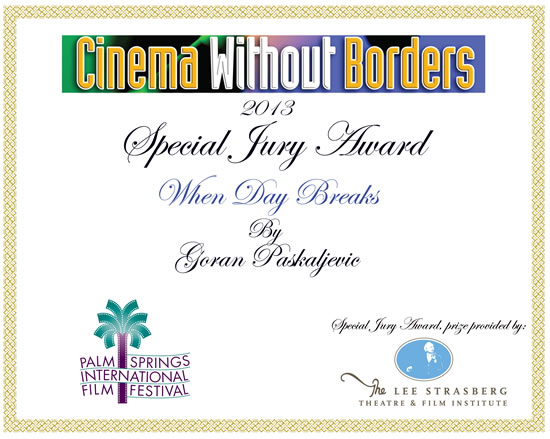 When Day Breaks, directed by Goran Paskaljevic is the Serbian Oscar submission that won Cinema Without Borders’ Special Jury Award at Palm Springs International Film Festival 2013. The Special Jury Award winner received a certificate for an upcoming Method Acting Intensive provided by The Lee Strasberg Theater & Film Institute in West Hollywood, CA—valued at $2000..
When Day Breaks, directed by Goran Paskaljevic is the Serbian Oscar submission that won Cinema Without Borders’ Special Jury Award at Palm Springs International Film Festival 2013. The Special Jury Award winner received a certificate for an upcoming Method Acting Intensive provided by The Lee Strasberg Theater & Film Institute in West Hollywood, CA—valued at $2000..
In When Day Breaks a retired music professor, Misha Brankov receives a letter requesting him to contact the Jewish Museum in Belgrade. There he learns that during an excavation at the city’s Old Fairgrounds, previously the site of an infamous concentration camp where some 48,000 Serbian Jews and Gypsies perished during the Second World War, an iron box was found.
The box contains personal documents and an unfinished musical score. It belonged to the composer Isaac Weiss, a concentration camp inmate in 1941. Eventually, the professor discovers that when he was an infant, his real parents, the Weisses, entrusted him to their friends, the Brankovs, just before they were taken into the camp.
The initial shock of the professor’s discovery gives way to a determination to fulfill the shattered dreams that he has inherited. It is something that infuses him with new purpose and provides him with a second lease on life. If director Paskaljevic has his way, this moving film will inspire an official memorial to the Jewish and Romany victims of Serbia’s shameful past.
Robin Menken: I feel terrible that I never saw Cabaret Balkan. Does it exist in with English subtitles? 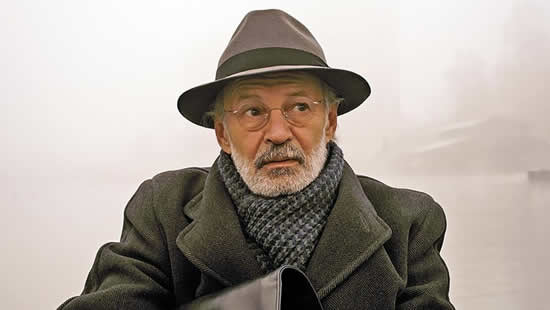
Goran Paskaljevic: It’s a very violent film, very different from this film.
RM: This is so delicate, like a watercolor of terrible memory and discovery. Can you talk about your friend Filip David and his involvement in the story and how you two together built the story?
GP: David and myself have collaborated for 40 years, from my first short film. He is 7 or 8 years older than me and he was the president of the drama section in Belgrade Television and he gave me my first job.
RM: Was this before you did documentaries or did you documentaries during this time?
GP: I did first 30 documentaries and after that I did just features,
RM: But he did work on those?
GP: He was involved, he was really like my brother and he is my best friend and we were next door neighbors by coincidence.
Dan Tana: They were inseparable during this whole period.
GP: When I made a film with Dan (Tana) as a producer, Fil came here: now he is a bit tired and he refused to come.
RM: What was that film called, Dan? NOTE: Fabled Hollywood restaurateur/ producer Dan Tana also produced Paskaljevic’s “Twilight Time” (1982).
DT: That film was called “Special Treatment” (“Poseban tretman”) and it won the Best Actress Award (Milena Dravić) at the 1980 Cannes Film Festival.
GP: and nominated for the Golden Globes.
DT: And actually that film could have won 3 or 4 awards if it was not for a Yugoslavian film director called Veljko Bulajić , who was on the Jury and he voted against us.
GP: I worked with Filip for almost 40 years and we prepared another beautiful script, maybe the best script I had in my hands but I could not find the money to finance it and in one moment last year I said to Filip that I need to work to do something in small budget and we come back again to the story of this film because we wanted to make this film ten years ago. But in one moment I said it is a small budget so let’s try again. So this idea is an old idea and it is simple and I kept if for a moment when I had nothing else to do, it is not commercial film so even the a very low budget is difficult to put together but somehow through private investors I find the budget. My wife helped me with her inheritance to start and but later the Ministry of Culture, promised us help and they gave us some basic money to do this film. Filip lost a lot of his family in the camp and in a way it is his story.
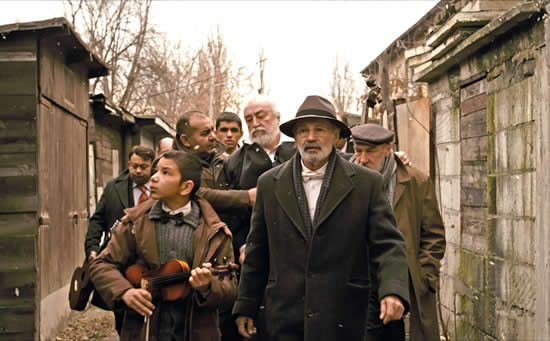 RM: He wrote everything except that little story that the actor who played the Rabbi added?
RM: He wrote everything except that little story that the actor who played the Rabbi added?
GP: This and also the lady refugee, I used real dialogue from the real refugee there. I sent the actress to meet her, they spent a few evenings together and we used the complete dialogue from that old lady that was still living there, there are still
living in the cells. She said “I changed the bars. I put nicer bars.”
RM: A piece black comedy, fantastic! wow!
GP: This actress is fantastic.
RM: How did you go about casting the film? You mentioned earlier that you cast people from all over the fractured Yugoslavia, and the crew. Your vision is to somehow reassemble that virtual space of creativity.
GP: Yugoslavia was what Europe is trying to be today, six republics and no frontier, no border…. Yugoslavia was a wonderful country and we married between each other, for example my first wife was from Zagreb and we did not pay attention to who is Muslim and who is Croatian, who is Serb.
DT: What he’s trying to explain, there was no problems with religious conflicts or hatred during Yugoslavia, and it’s impossible for us who were born and raised to realize that country does not exist anymore and we did not do anything to destroy it, it was destroyed and we don’t know who destroyed it.
GP: I know who destroyed it.
DT: The ambition of a few individuals
GP: from one side Milošević, in Serbia who wanted to be the new Tito, from the other side Franjo Tuđman, who was supported unfortunately by the Catholic Church very strongly and Germany who recognized Croatia before anybody else and that was the start of the conflicts.
DT: Croatia was financed by the former Nazis from Croatia who emigrated to Argentina, Brazil and the United States. Andrija Artuković, one of the worst criminals, lived here in Los Angeles till he was ninety years old and was never sentenced back to Yugoslavia. Yugoslavia did everything to get him back, finally Reagan extradited him shortly before he died. Including the United States, the whole Western World took these Nazis and protected them which is tragic.
(Artuković, the highest-ranking fascist official known to have found refuge in the United States after the war, was extradited to Yugoslavia in 1986. He died in 1988 in a prison hospital in Zagreb, where he had been condemned to death for mass murder at the age of 88.)
RM: How many of the cast was familiar with this story? Including the gypsies?
GP: They were familiar because they are educated, and during the shooting of the scene in the old fairground (Site of the Sajmište concentration camp.) There is a scene where a professor says “Oh, I didn’t that know much about this and the members of the crew told me, “come on, nobody will believe that a man who’s 70-72 didn’t know anything.” But that’s the reality. And they said, “But he’s an educated man, he must know what happened,” I said, “You know about it because you read the script.” So I stopped shooting, went to the street and stopped ten different people of different age. They know my face in Belgrade pretty well, for 40 years I’m on television. So I asked them just one question. “Do you know what took place in the old fairground?” Only two said it was some kind of concentration camp during the war. You see, and that’s why the sentenced stayed in the film. There was a very important sentence in the film. The rabbi said” “Crimes remain, criminals stay unpunished, and the indifference of the world remains.”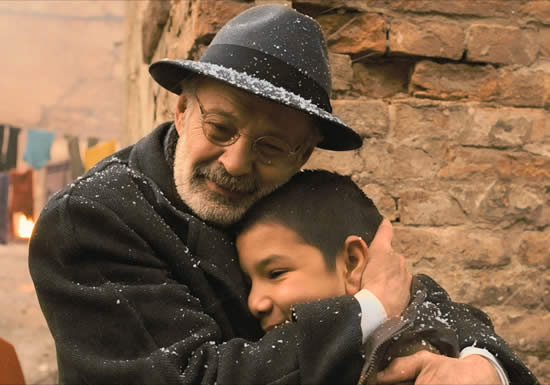
RM: I loved the delicacy with which he went through the stages of accepting this gift, terrible and beautiful gift. At first, it was so mild, he said, “No this has nothing to do with me” and then the first big scene with the brother.
GP: I love that scene.
RM: That was a fantastic scene because it all came up like a stew, everything that he had been repressing now is coming up, that’s a beautiful scene, then the scene with the rabbi….
GP: I invented that they hitch up the horse together on the set.
RM: That was so important
GP: I need to feel that they were together,
RM: …as farmers, and very practical. We watched them working together, as brothers.
GP: So they practiced with the horse all day.
RM: That’s a beautiful scene and a wonderful actor who plays the brother
GP: The actor who plays the brother, this is his first time in a movie. Can you believe it? He lives in Novi Sad, which is 80 kilometers from Belgrade. He is in theatre. It is his first or maybe second film. He is 83. Because if you don’t live in Belgrade where there is television and films, you will just stay in your little provincial theatre and he and the other guy who plays Mr. Najfeld (Toma Jovanovic ) he is also from Novi Sad. He hasn’t played in a film in twenty years. Unfortunately immediately after the movie he died. You saw his name framed.
RM: Also, the scenes which built his acceptance: the scene where he went into the synagogue where the Rabbi says, “Are you a Jew?” and he said. “I don’t know.” all of that was so artful. And the moment at the memorial,
GP: Where he said cover your head…
RM: I loved that because it took something ephemeral and made it very practical. Then when he is at the event and he says so lightly, “Weiss was my father.” Step by step you built his acceptance, and it was so delicate. That’s why I said it’s like a watercolor. Very trusting. You trusted the audience that you could just fill in a little layer here and then another little layer there.
GP: In fact I edited this film myself with the help of a girl whom I gave all the credit, I wanted to have everything played a couple of seconds more, that would involve you in the film, it slowly takes you into the film.
RM: This is something that classic Japanese directors would do; they would let a scene build, build, build, until the emotion come back like a backwash.
GP: I studied film in Prague schools. At that time it was a great school
my real studies were watching the nonrealistic films and “Umberto D”.
RM: I was Rossellini’s assistant.
GP: Oh really? Ah…
RM: I loved the dream moment with the parents and the symphonic
music…he disappointment that he could not get the most marvelous musicians, but then by accident he did have the perfect musicians, and then he imagined this great symphony and it was with his parents, it was so beautiful this sequence.
GP: This was in his head.
RM: and that scene with the son, disappointing him and then clicking off, it’s everything about modern life in one scene.
GP: I had a similar scene with my son (laughing).
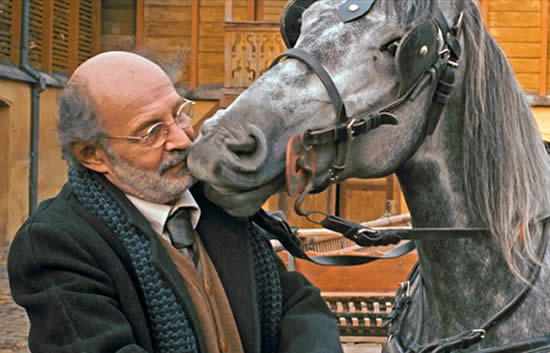 RM: I had a similar scene with my daughter, too. It’s very modern.
RM: I had a similar scene with my daughter, too. It’s very modern.
GP: They don’t care about us.
RM: Nothing. They don’t seem to care about anything. And that click at the end of the line. Nothing.
GP: They are okay and they are talented but they have their lives but past? Come on.
RM: The phone conversation with the son, when he asks for help on the concert. “I sold the piano to pay for your classes”. “What piano?” Sad. Can you discuss the shot where he’s on the river, the photomontage. That’s also very beautiful.
GP: Oh yeah
RM: Can you talk about how you discussed the look of the film with the DP and how you discussed the music with the composer.
GP: The composer (Vlatko Stefanovski), I like him very much because he is very emotional, he is not someone who writes the notes, he is a guitar player and he is naturally talented and he offered me a couple of compositions and I chose that one because when I was listening I had a tear in my eye and I wanted him to really come back to the real emotions because my real feeling is that the emotion is lost from the cinema today, everything is action and tension and violence
RM: Or extremely pretentious
GP: Very pretentious
RM: Post Structuralism run amuck.
GP: I don’t have anything against special effects, if they say something.
RM: If they serve the emotions and the story.
GP: Exactly, but if they are just art for arts sake…I wanted to be a painter, but finally I decided to be a filmmaker when I saw “The Bicycle Thief.” I fell in love with this film because I was working in a cinematheque when I was 16, at the entrance, taking tickets. The privilege was I could watch the films and have some guests for free and this is how I fell in love with films and decided to not be an artist even. I said to myself, “I draw well but I don’t think I’m such a big talent to be a painter but art always stayed on my mind. I was afraid with this film that maybe the film was over styled, but I needed the strong beautiful pictures.
RM: No, you handled it very organically. Tell me about the script that you didn’t get to do, is that going to be the next one?
GP: I don’t know, because the problem is
that is has happened during the war, the Second World War, it is a period piece, a beautiful script but I need German actors because it is in the family of “False Deutsches”. (The region was full of German resident since the time of the Austrian-Hungarian Empire .The concentration camp was maintained by both the Croatian Utasha forces who were early Nazi allies, and their Serbian collaborators.) So the producer said “Who is going to give the money for a German-Serbian film? Why don’t you do it in English?” and I don’t want to do it in English. Once I made a film in Serbian and English and it was a mistake. I didn’t feel free with it. They promised us a Serbian dubbed version, the Serbian company but they never gave us the money
DT: “Twilight Time.”
RM: I think the Taviani Brother’s career flat-lined when they did ” Good Morning, Babylon”, it looked incredible but what is normally wonderful in their films suffered in translation. It felt like big gaps in the story and the performances. So, you don’t know if you will do this period film.
GP: I don’t feel like doing anything big. The idea for this film came from me and Filip together in one afternoon discussion.
RM: Can you talk about the lead actor?
GP: The lead actor (Mustafa Nadarevic) is a Bosnian Muslim who is considered a Croatian actor because he spent his life in Croatia and he plays a Serbian who discovers that he is Jewish.
RM: And now everyone will assume that he’s a Jew. It’s wonderful
GP: He is such a wonderful man and a great performance. Maybe this performance and the suffering on his face, which came from the fact that his wife, she is twenty years younger than him, had a cancer in the beginning of filming. So after four weeks we stopped filming because it was a very aggressive cancer. And after four months, he just came for one week, when she was in hospital, not for two. We put everything in one week, just to finish the film, and three months later she died. So every night he was talking on the Skype with her. She was in the hospital in Bugojno. I said, “it’s horrible, we’re never going to finish the film”. And he came and he said, “No, you and all those people who work on the film depend on me and I have to be here. I came every morning to pick him up to go to the set, and a couple of mornings he was just in tears. I never met such a wonderful human being like him. He is someone who thinks first about others. So we are flying to Paris Thursday and he will come to visit us Saturday morning. He will stay with us for five days. In summer we took him seven days with us, Christine and me, just to raise his spirits.
RM: So this was how long ago you finished?
GP: We finished the shooting in the end of February, but after I had a financial problem, so I finished the film in August and didn’t have time to offer it to Cannes or Venice, but the film opened in the Master’s section in Toronto. And now it’s here.
RM: And the little boy?
GP: The Gypsy guy? It’s not easy to find a Gypsy who really plays the violin. They play accordion. Most of them, but this little one, he’s wonderful, Bole, he’s a natural talent

